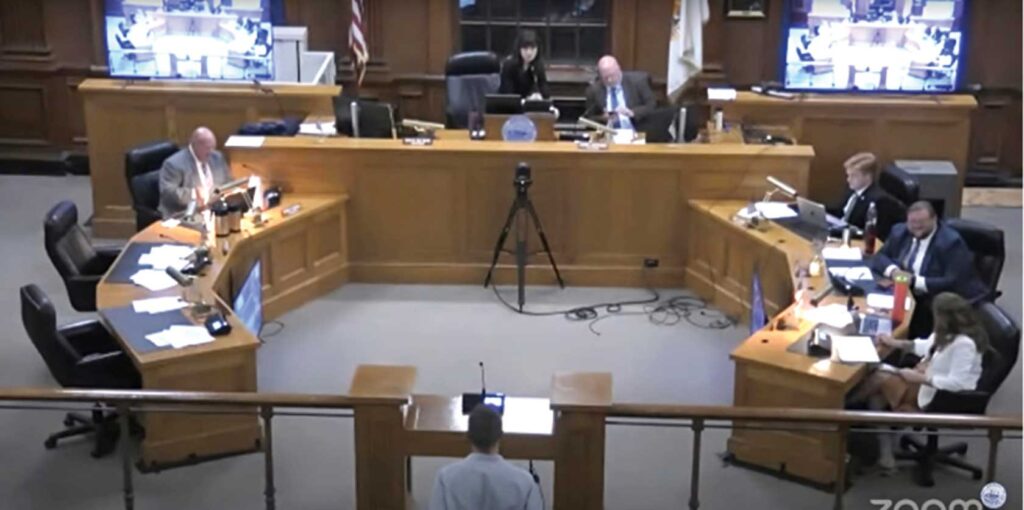Medford passes landmark ordinance to divest public funds from fossil fuels, weapons, prisons

The Medford City Council has voted to advance a sweeping ordinance that would bar the city from investing in fossil fuel companies, weapons manufacturers, private prisons and businesses linked to human rights violations — making it the first municipality in Massachusetts to take such a step.
The Values-Aligned Local Investments Ordinance passed in a 5-1 vote during the council’s Aug. 5 meeting, with one councilor absent. It must clear two more procedural readings before becoming law, but it already has the supermajority needed to override a potential mayoral veto.
Dozens of residents packed the council chambers for more than three hours of testimony, with the vast majority urging the city to align its finances with ethical and environmental values. Supporters said the measure reflects growing public concern over how municipal funds — beyond regular budgets — are invested.
“We are in a new era where taxpayers are not just concerned with the services they receive as part of a city and town, but also how city and town resources are impacting global issues,” said Medford City Council President Zac Bears, who sponsored the ordinance. “It’s heartening to see Medford take this on. We hope this proactive approach to ensure that municipal resources contribute to the public good and not to major forms of harm will become a trend.”
What the ordinance does
The measure would require the city to redirect investments toward funds and institutions that support environmental sustainability, racial equity, affordable housing, worker rights and Indigenous sovereignty. While it would not affect the city’s retirement funds, it would apply to other public holdings, including reserves and trust funds.
Language in the ordinance commits the city to investing “in ways that promote the well-being of our communities and our environment,” in line with the draft preamble of the proposed city charter.
The push for the policy began after residents obtained a list of Medford’s investments through a public records request, revealing holdings in Chevron Corporation, Lockheed Martin and Intel. Proponents argued that such investments contradicted the city’s stated climate and human rights goals.
Local concerns, global context
Public funds are often invested in large portfolios designed to generate returns for municipalities. In 2025, state and local gross investments nationwide were valued at more than $632 billion, with nearly $6 trillion in public pensions — making local governments significant shareholders in U.S. markets.
Medford resident and attorney Micah-Shalom Kesselman said the ordinance reflects shifting public expectations.
“There is expanding clarity among the American public about how they want public money to be used and not used,” Kesselman said. “People are clear that they want quality public services at the local level, not billions being spent on forcibly starving the civilian population in Gaza to death. People are clear that they want money spent to support services for veterans and children, rather than masked ICE officers detaining our friends and neighbors and tearing apart families. This ordinance puts that clarity into action in a concrete way.”
Health care worker and Medford resident Dina Alami, who has family in Gaza, called the vote “one small step” toward ensuring that local tax dollars serve public interests.
“Americans don’t want our tax dollars spent on war crimes like forcibly starving children in Gaza, all while our lawmakers in Congress plan to slash $300 billion in SNAP benefits which feed American children.” Alami said. “War is a huge industry. This ordinance is one small step in making sure our tax dollars serve the interests of people rather than billionaires.”
Anna Meyer, a local history teacher and immigrant rights advocate, linked the ordinance to concerns over private immigration detention facilities.
“ICE is detaining students, tearing apart families and detaining our neighbors in for-profit facilities where they are subject to medical neglect and lack of due process,” Meyer said. “This ordinance represents an important step to ensure that the tax dollars of Medford residents will not be invested in companies that profit from maintaining these inhumane conditions.”
Backed by broad coalition
The measure drew support from a range of advocacy groups, including Medford’s Energy & Environment Committee, Medford for Palestine, the New England Jewish Labor Bund and Medford People Power.
In a letter to the council, the Medford’s Energy & Environment Committee wrote that divesting from fossil fuels is “clearly in line with our appointed mission and the goals of Medford’s Climate Action & Adaptation Plan,” and urged the city to “affirm its commitments to a safe and sustainable future for all.”
Part of a wider movement
The concept of socially responsible investment gained prominence during the anti-apartheid movement of the 1970s and 1980s, when universities and municipalities divested from South Africa. In recent years, similar campaigns have pushed institutions to cut financial ties with the fossil fuel industry, tobacco companies and other sectors linked to social and environmental harm.
Advocates say the conversation has expanded to include investments in companies tied to alleged war crimes, with the ongoing conflict in Gaza cited as a major catalyst. While the ordinance addresses only Medford’s public funds, supporters hope it sets a precedent for other municipalities in Massachusetts and beyond.
The next readings of the ordinance are expected in the coming weeks. If it passes, Medford will join Portland, Maine, and Dearborn, Michigan, as one of the few U.S. cities to formally divest municipal funds from sectors deemed harmful by local policy.
A full recording of the meeting is available on the City of Medford’s YouTube page.







Leave a Reply
You must be logged in to post a comment.